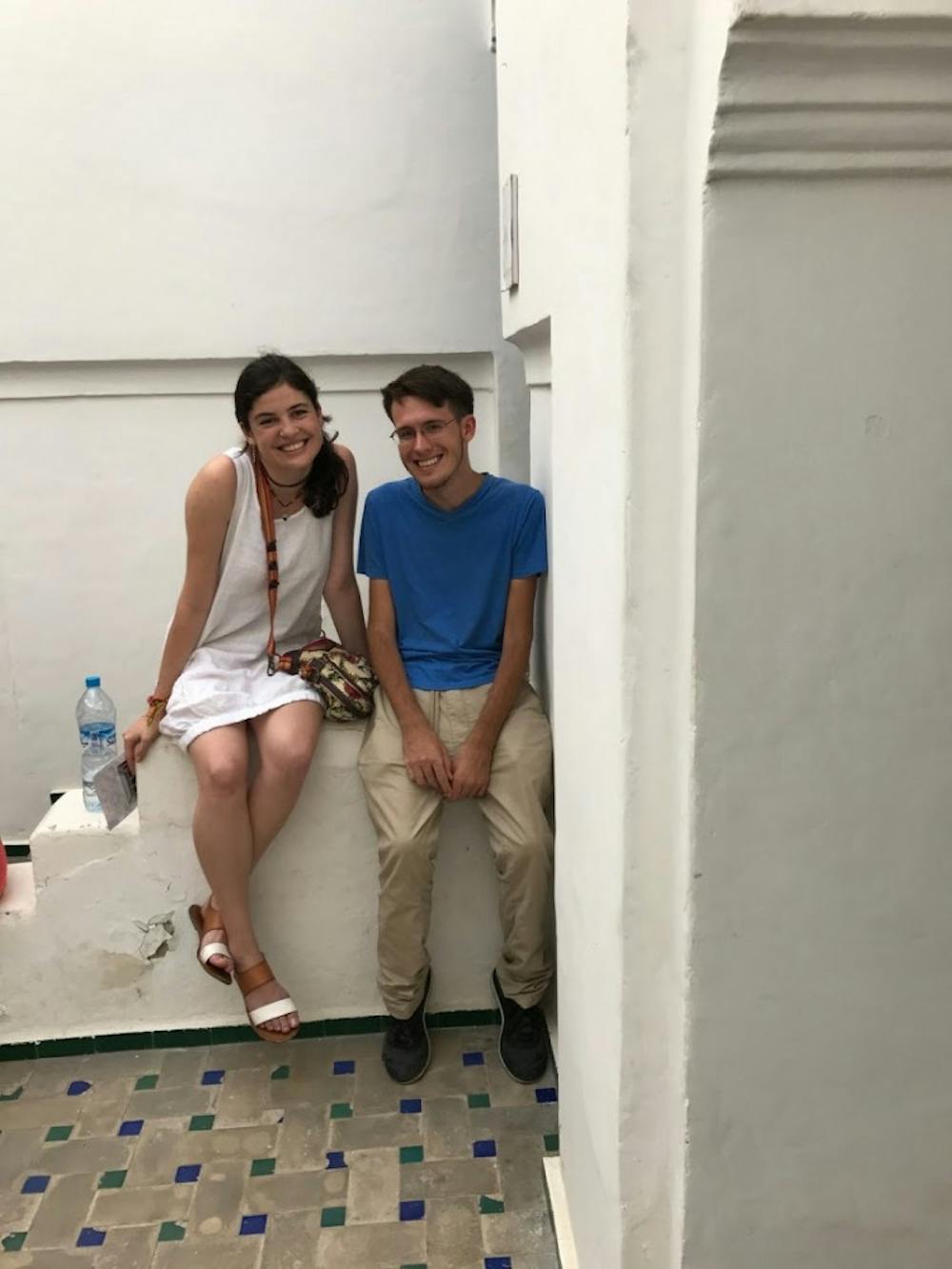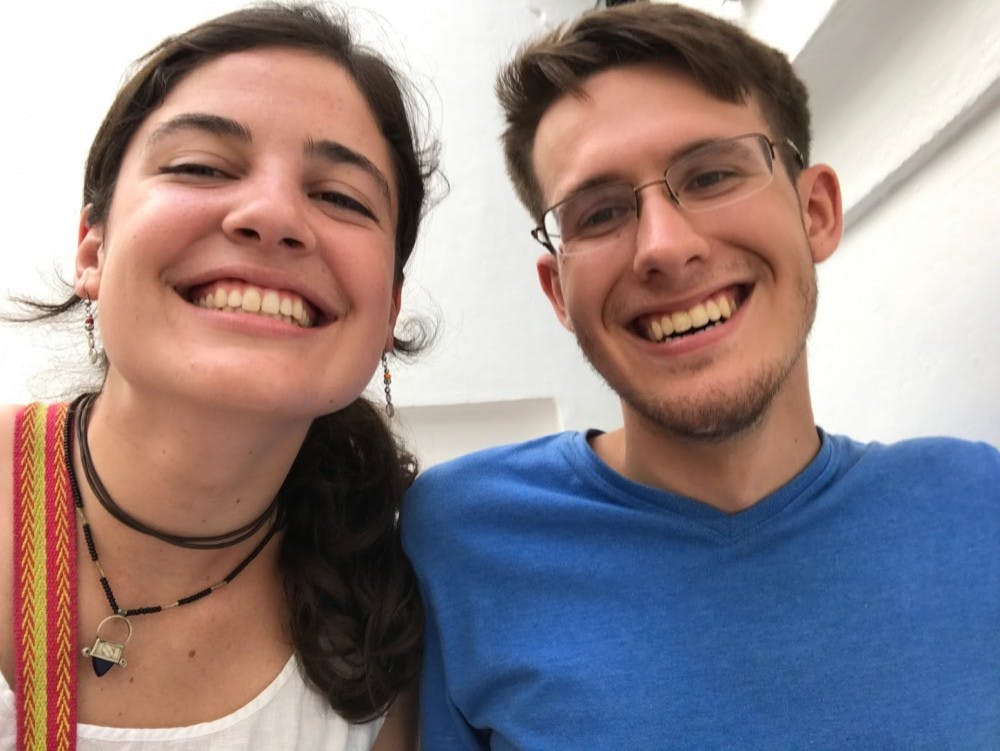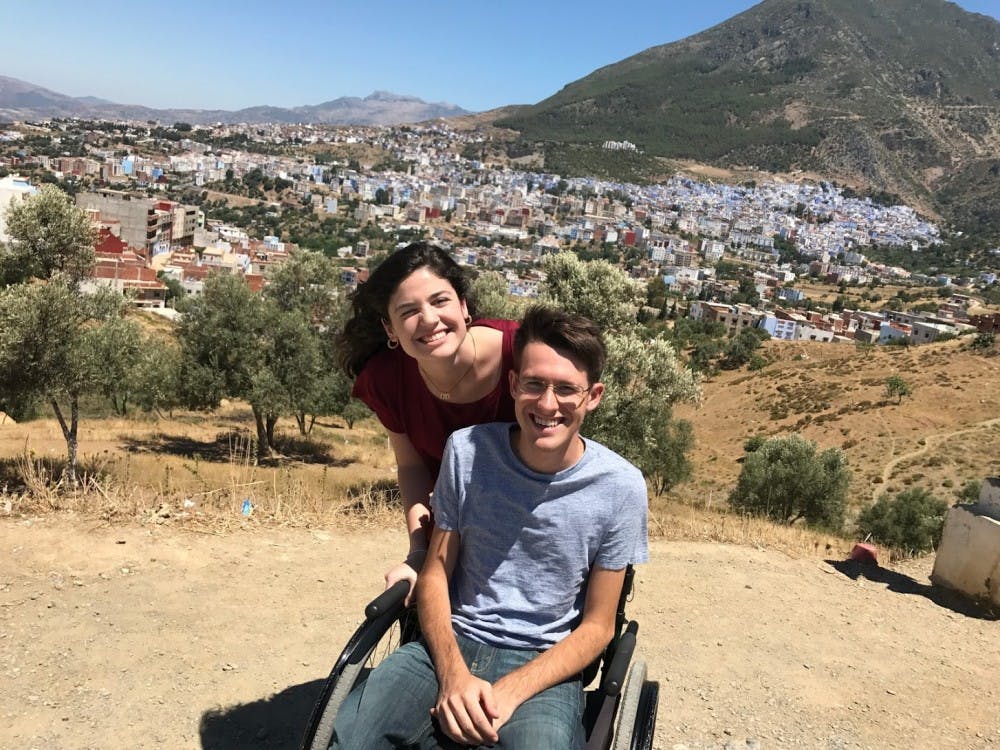One of the most peculiar things I have ever witnessed happened in the small, winding alleyways of Fez, Morocco, while I was studying abroad there with the Duke in the Arab World program. Our group of 14 students followed our tour guide to the entrance of one of the famous Fez tanneries—a place where leather gets washed and dyed—and promptly began climbing the never-ending staircase that led us to the stunning view of the basins of dye on the building's roof.
For Bryan Rusch, one of two males on the trip and the only one in a wheelchair, this situation presented a problem he was used to encountering.
“The world just isn’t made for me,” the sophomore told me one day after class as our Moroccan friend Meriam pushed his chair onto a rough street curb.
But before he could say anything that day at the tannery, a large Moroccan man sitting at a nearby shop saw our group and identified Bryan’s problem quickly. He came over, lifted Bryan up from his chair and threw him over his shoulders, taking him all the way up to the top of the building, where he sat Bryan down in a traditional Moroccan leather poof that had been handmade and dyed right in the shop.
“A lot of the times, when it came to assistance, people would just unquestionably assist, which was kind of unique,” Bryan told me when we talked about the incident months later in his Swift apartment on Duke’s campus. “That man just walked up that rat’s nest of a building and threw me down on the poof, which is why I ended up buying two poofs.”

For the tannery’s owner, it was a dream to have an immobile customer sitting right among the leather poofs—the tannery’s most expensive products. He began his fantastic bartering, his insistence a trademark of Fez salesmen. And no matter how absurd his prices or how annoying his urging, Bryan had no choice but to sit there and take it, since walking away wasn’t an option. Eventually, the price was lowered enough for Bryan to buy one.
The array of obstacles and difficult situations that Bryan has had to go through because of his disease, muscular spinal atrophy, have not always resulted in new furniture and a funny story. Bryan—the youngest of three boys—has an older brother with the same condition but to a worse degree, so Bryan grew up knowing that his life would be difficult and full of challenges.
Spinal muscular atrophy is a neuromuscular degenerative disease in which one of the genes maintaining muscle mass is completely gone. The backup gene produces about 20 percent of what the main one does, but forms of the disease vary greatly. Bryan is Type 3, which means he will stop being able to walk at some point, but has yet to entirely lose the ability.
“I don’t fit into the normal stuff," he said. "I’m a little weird.”
Weird is a harsh way to put it, but Bryan isn’t fond of bragging. He’s extraordinarily clever and realistic, which is how he copes with the frustrating aspects of his life.
He recalled that on his first day on the playground when he was in kindergarten, he approached other kids by saying “Hello, I’m Bryan, I have this disease…I can’t run as fast as you, but I still want to play games with you.” Sure enough, he’d play, but not without some devious strategizing.
“I couldn’t chase the kids as fast, so I would wait on the steps of the playground and ask everyone to hold up," he said. "They’d all come up to me worried that something was wrong, and then I’d get them and say, ‘Tag, you’re it now.’”
Bryan had to switch schools several times throughout his youth, though he never had to leave his home in Jacksonville, North Carolina. He "got the military experience without ever having to move," as his father was a communications officer in the Marine Corps for 27 years and his mother was a nurse who would pick up whatever job she could find at Bryan’s school, from librarian to teaching aid, so she could be close to Bryan and take care of him and his brother.
Oddly enough, Bryan’s school changes lined up perfectly with his changes in ability—when he began to use a wheelchair in fourth grade, he switched schools. When puberty hit and his center of mass changed in middle school, he switched schools again. This time, he was no longer able to be competitive in sports.
“First day of P.E. in sixth grade was terrible,” he remembered.
Bryan had to adapt to deteriorating levels of strength in unfamiliar places surrounded by new people, which meant that others’ perceptions of him often didn’t align with his own perceptions of himself.
Get The Chronicle straight to your inbox
Sign up for our weekly newsletter. Cancel at any time.

“I felt more like the Bryan I used to know, not the Bryan that all these kids were just meeting,” he said.
By high school, when Bryan once again started somewhere new, he could no longer stand up, get out of chairs or endure walking as easily as he could before.
While I was interviewing him, I was impressed by how nonchalantly and kindly Bryan spoke about the physical deterioration he had to go through at such a young age. When I asked him if these changes had been difficult, like the moment he realized he had to get a wheelchair, he told me that it had all felt incredibly normal.
“To have something like this, it’s a complete other life—it’s a degenerative, incurable, deadly disease," he said. "So even at an early age, I understood that that’s just how life goes.”
But things got more difficult than that. At the end of his senior year of high school, Bryan suffered an ankle injury from which he hasn’t been able to fully recover, and losing a large part of his independence has been extremely painful and frustrating. His disposition would completely change from cheery and positive to confused and disheartened when we’d go from talking about his youth to speaking about the last two years of his life.
Bryan became permanently stuck to his wheelchair about a week before Orientation at Duke, and his first year brought a bout of reflection that made him feel angry for the first time in his life.
“I came to the realization that my life has just not been fun," he explained. "I slowly came to terms with how terrifying everything was, not just life in general but what I’d lived through and what I was running away from."
He began to realize how hard he’d tried to deny the fact that he was losing ability and that his strength was clearly deteriorating. He could no longer avoid the threat of never being able to walk again, something particularly difficult to wrestle with in college.
"Everything was gone. Even walking was gone," he said. "I no longer had anything to hold onto that was stable—every morning I’d wake up and not know how far I’d be able to walk. I still don’t.”
Bryan felt disabled for the first time at Duke. No one would sit with him in the front handicapped row of Page Auditorium during orientation programs, and it would be nearly impossible to insert himself fluidly or naturally into conversation at events.
However, he quickly found companionship in Tommaso Babucci, an international student from Milan who is also in Bryan’s class and lived in Pegram with him their first year. They met casually at Marketplace and bonded over how alien they felt at Duke—Bryan because he couldn’t walk, Tommaso because he couldn’t adapt easily to American culture.
“He was stuck with his bad legs, and I was stuck with my accent,” Tommaso said.

Since Bryan’s handicapped room in Pegram was absolutely giant, Tommaso had practically moved in by the end of their first year. He recalled that even his passport and visa were in one of Bryan's drawers.
Now, the two of them practically finish each other’s sentences and remember all their adventures at Duke together just as any other college kids would. They embrace how much they stand out, something that’s been easier for them to do together, and they have the kind of hilarious and heartwarming relationship that makes you hope in humanity a little more.
Tommaso told me that he’s even begun to “move like a wheelchair,” in that he’ll take pathways that are handicap accessible even when Bryan isn’t around, just out of habit. The two have been to Iceland, Italy and Tokyo together, and their plans for spring break are no less ambitious. Tommaso carries Bryan up the stairs to Central Campus apartments whenever they go to a party together, and Bryan fills in Tommaso’s stories to ensure that his faulty English doesn’t ruin or omit any important details.
When I went to their apartment to interview them and try Tommaso’s incredibly delicious chili—the guy can cook—we ended up speaking at length about how Bryan is perceived so differently by people at Duke. Tommaso gets frustrated by how people pity Bryan and can’t look at him without seeing his wheelchair.
“I eventually stopped seeing it,” Tommaso said as Bryan poured him tea. “But people see it so much.”
Bryan, an avid reader and introspective teenager, believes that he represents a physical manifestation of human brokenness that people cannot come to terms with, that people are afraid of encountering.

He read me a long quote from the Class of 2020 summer reading—"Just Mercy" by Bryan Stevenson—that had spoken to him on a deep level: “We are all broken by something. We have all hurt someone and have been hurt. We all share the condition of brokenness even if our brokenness is not equivalent. But our brokenness is also the source of our common humanity, the basis for our shared search for comfort, meaning and healing. Our shared vulnerability and imperfection nurtures and sustains our capacity for compassion. We have a choice. We can embrace our humanness, which means embracing our broken natures and the compassion that remains our best hope for healing. Or we can deny our brokenness, forswear compassion, and as a result, deny our own humanity.”
I don’t know if Bryan is right that his brokenness scares people away. I think, on a simpler level, many just don’t know how to approach someone whose life is so obviously different.
But I do know that I’m grateful to have someone like him in my life. Bryan is thoughtful, intelligent, kind and patient. He is curious, clever, realistic and a startling reminder that yes, life is difficult, but hey, that’s just how it goes. He’s read half the world’s history books because he literally has a backpack on wheels, and he often ends up sitting alone in the handicapped section, doing his reading. While other kids were playing sports in their spare time, Bryan taught himself bits of Arabic and Icelandic. He hates depending on others for help and is reluctant to ask for assistance, but he responds to my texts within milliseconds whenever I need something from him.
I don’t think Bryan is brave for what he has gone through because he hasn’t really had a choice for most of it. But I don’t think he cares to be brave—he’s just really trying his best to be human. And turns out it takes fantastic courage to face one’s own fallible and flawed humanity, and Bryan does that every single morning when he wakes up and walks into the shower.

The fact that he keeps getting up, despite not knowing how far he’ll go or whether anyone will talk to him, makes him courageously human. Bryan refuses to miss out on any of life’s experiences, even if that means going through discomfort and physical pain because he understands that it’s all part of the package. His wheelchair may scare some away, but getting to know Bryan and watching him conquer Morocco has been nothing short of an absolute honor for me. Because it’s nice to know that when life throws you a deadly, incurable, degenerative disease, you can still get someone as absolutely fantastic as Bryan Rusch.
Daniela Flamini is a Trinity junior. Her column runs on alternate Mondays.

